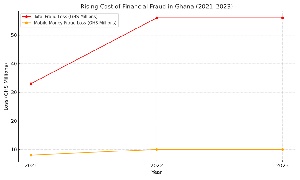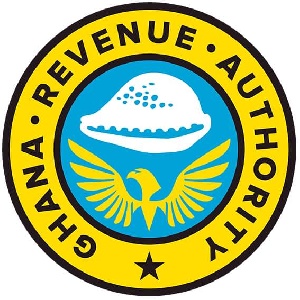- Home - News
- Elections 2024
- News Archive
- Crime & Punishment
- Politics
- Regional
- Editorial
- Health
- Ghanaians Abroad
- Tabloid
- Africa
- Religion
- Photo Archives
- Press Release
General News of Saturday, 19 April 2025
Source: www.ghanawebbers.com
The Data-Driven Truth about Financial Scams in Ghana
Ghana’s Growing Scam Problem: What the Numbers Say
Mobile money fraud is increasing in Ghana. The Bank of Ghana’s 2023 Financial Stability Review reported 13,451 fraud cases in the financial sector. Mobile money fraud made up 20% of these cases, nearly 2,700 incidents involving services like MTN MoMo, Vodafone Cash, and AirtelTigo Money.
In financial terms, Ghana lost about GH¢56 million to fraud in 2022. This is a significant rise from GH¢33 million in 2021. Over GH¢10 million of this loss came from mobile money scams.
From January to August 2024, the Cyber Security Authority (CSA) reported 149 online investment fraud cases. These resulted in losses exceeding GH¢1.9 million. This is a sharp increase from just 63 cases during the same period in 2023.
These figures only show reported cases. Many go unreported due to shame or fear.
How Are People Getting Scammed?
Modern scammers rely on human error rather than brute-force hacking. A tactic called social engineering has become popular among fraudsters in Ghana.
Social engineering involves tricking people into giving away confidential information. Scammers may ask for your MoMo PIN or one-time passwords (OTP).
Here’s how it usually works:
1. You receive a call from someone pretending to be a telco or bank agent.
2. They sound professional and claim there’s an issue with your account.
3. They convince you to “verify” your identity or dial a USSD code.
4. By doing so, you unknowingly authorize a transaction, and your money disappears.
It happens quickly and can affect anyone.
The MTN MoMo Case That Sparked National Conversation
In April, a woman revealed that GH¢11,000 vanished from her MoMo account. She claimed she hadn’t shared her PIN or clicked any strange links. This case raised major concerns online, prompting many Ghanaians to demand answers from MTN.
MTN Ghana responded by stating their systems were not breached. They attributed the incident to social engineering—suggesting the customer may have unknowingly shared sensitive information with scammers.
This story has become a national case study on digital trust and personal caution.
Who’s Protecting the Public?
Telcos like MTN and Vodafone regularly send alerts advising customers not to share their PINs or OTPs. The Cyber Security Authority of Ghana also runs education campaigns periodically.
However, data shows over 50% of mobile money users lack awareness of digital scam tactics. Many people, especially in rural areas or among the elderly, do not fully understand how scammers operate.
This leaves many vulnerable to scams.
5 Data-Backed Tips to Stay Safe
1. Never share your MoMo PIN or OTP with anyone.
2. No telecom agent will ask you to dial a USSD code for help.
3. Enable two-factor authentication (2FA) on email and financial apps.
4. Don’t store sensitive info like passwords on unsecured apps.
5. Report scams immediately to your mobile provider or the CSA via 292.
In conclusion, financial scams are robbing Ghanaians of their money and eroding trust in digital systems meant for convenience. As more services go cashless, this issue needs addressing through data analysis and public education.
As Ghana moves toward a digitized economy, staying informed is essential for everyone.
*Written by: David Nii Armaah*
*Research Analyst & Industry Voice*
David Nii Armaah is an experienced researcher with expertise in data and technology innovation.
Connect via LinkedIn: [David Nii Armaah](https://www.linkedin.com/in/david-nii-armaah-7bbba8155/)











